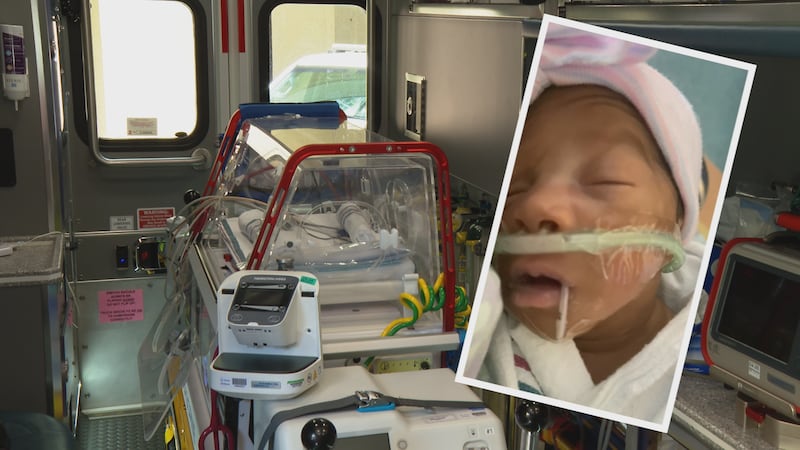Nearly 9 years after his arrest, an accused murderer awaits trial
Bill Haynes was murdered in 2016. Police immediately arrested a suspect, but he’s never gone on trial.
ATLANTA, Ga. (InvestigateTV) - When Bill Haynes studied music in college, he told his mother he didn’t see himself as a teacher. After volunteering just one day at a Kentucky elementary school, he changed his mind.
“He said, ‘I see why you like it, Mom,” said Kay White, his mother, a former schoolteacher herself. “He said, ‘Those kids were so great.’ I don’t think he ever stopped feeling that way.”
Haynes taught music in public schools for more than 30 years, the majority of that time in Georgia and at Atlanta’s E. Rivers Elementary.
When Haynes wasn’t in the classroom, he was the conductor of the Alpharetta City Band. “Bill had an unbelievable ear,” said band member Dan Mayhue, and “If he needed to give you some criticism, he did it in a way that was joking that you didn’t feel like he was making fun of you,” said Rob Rickles, another band member.
Haynes’ life full of music came to a sudden stop eight days before Christmas 2016 when police found him dead inside a Sandy Springs storage facility. He was 53.
Police say Justin Paul Hess attacked Haynes with a knife; investigators said he killed his own mother, Carol Ann Hess, the same day.
Nearly eight years after Hess’ arrest, he’s never been convicted of a crime because doctors said he’s not competent to stand trial.
While Hess’ court-appointed attorney, Kevin Rodgers, does not believe his client will ever be mentally competent to stand trial, the Cobb County District Attorney’s office is hopeful to one day take the case to a jury.
Outgoing District Attorney Flynn Broady believes Hess could be faking his mental illness to avoid prison. “He may be gaming the system because he’s smart enough to know the law [and] smart enough to follow the law [and to} know right from wrong and aid in his defense,” Broady said.
If Hess is found competent, he’ll face charges in Cobb County first because that’s where he allegedly killed his mother. He would then go to trial in Fulton County, where Hess is accused of killing Haynes.
If Hess is found guilty of killing his mother, he faces life in prison without parole. That sentence could convince the Fulton County District Attorney’s office to agree to a plea deal to avoid a redundant outcome. That’s something White doesn’t want to see. “I want to see a jury listen and pronounce a decision,” she said, “and then, I want to see him pronounced innocent or guilty.”
Videos of Hess posted on YouTube before his arrest show him holding military-style rifles and ranting about the government. “We have some tyrants around here that need some dealing with and it’s pretty blatantly obvious what needs to take place,” he said in one video.
In another, you can hear Hess speak with Cobb County police officers after someone saw him walking with an assault rifle. In the video, Hess clearly articulates his gun rights and Georgia law.
“You’re not planning to go into any grocery stores or anything like that?,” asked the officer. “No sir. I will not be entering any private or federal businesses,” Hess responded. “Just trying to show people that not everybody trying to exercise their rights or with a firearm is a loony tune.”
For White, the video of Hess speaking with officers shows he knows the difference between right and wrong.
According to county records, Hess has spent the majority of his nearly eight-year detainment not in the Cobb County Jail, but at Georgia Regional Hospital, a state-run hospital that provides mental health services.
In 2021, a doctor determined Hess was competent to stand trial, but by the time the trial was set to begin months later, Cobb County Superior Court Judge Julie Adams Jacobs wanted another competency evaluation performed and ordered the Georgia Department of Behavior Health and Developmental Disabilities to do it.
That evaluation took 118 days, again delaying Hess’ trial date. Last year, Jacobs ordered the agency to conduct another competency evaluation. This time, it took 356 days.
Our investigators uncovered the pattern of delays in Hess’ case is not an isolated problem. State records show it’s happening across the state, often crippling Georgia’s criminal justice system and delaying justice for defendants and crime victims.
During a legislative committee meeting in January, the commissioner of the Georgia Department of Behavior Health and Developmental Disabilities spoke to lawmakers about a dramatic rise in court-ordered mental health services requested for criminal defendants.
“Here’s what gives me heartburn and keeps me up at night,” said Kevin Tanner, standing next to a presentation that showed a 195% increase in individuals waiting for treatment and competency evaluations at state hospitals from 2021 to December 2023.
Tanner’s agency’s goal is to perform evaluations in 45 days. In some parts of the state, it averages more than six times that long. While the Covid pandemic played a significant role in the increase, other issues are at play.
Tanner said there are not enough beds available at its state-run mental health hospitals for people who need treatment in Georgia. That involves people who are having a mental health crisis and persons charged with crimes who need restoration services to get them competent to stand trial.
Of the 641 beds available at state hospitals, Tanner said about half are for patients ordered to the agency’s custody because a judge has ruled them insane. That leaves only about 300 beds that can be regularly used for forensic restoration services, which include defendants like Hess.
Tanner said about 700 individuals are on a waiting list for a bed at a state hospital. He said a recent audit shows the state will need eight more crisis centers within the next 10 years. The state also needs about 119 forensic beds by next year to fill the need, a figure expected to grow as Georgia’s population increases.
“We’re running at full steam with the number of beds we have,” Tanner said, adding Georgia also doesn’t have enough mental health professionals to treat defendants. The vacancy rate for state forensic psychologists is 34%, and while Tanner said those professionals have recently received a raise, it hasn’t filled the gap.
“When you hear Georgia’s ranked low and mental health access, it’s not the quality of the care we provide in Georgia is the fact that our state per capita, per population, we just don’t have enough licensed clinicians,” Tanner said. “We don’t have enough psychologists in Georgia.”
While Tanner waits to see if lawmakers will increase funding, he said his agency is working with local jails to house and treat some defendants in need of restoration services. These are individuals who Tanner said receive the same level of service as they would in a state-run hospital, but at local detention facilities.
For example, the agency funds about 14 forensic beds inside a jail run by the Chatham County Sheriff’s Office near Savannah. Cobb County’s jail operates about of these 20 beds.
“There’s not a silver bullet quick fix answer to this,” Tanner said. “It’s going to take time. We’ve got to have obviously more capacity in the system.”
Copyright 2025 Gray Media Group, Inc. All rights reserved.















